Henslin James M. Sociology: A Down to Earth Approach
Подождите немного. Документ загружается.


Education in Global Perspective 501
What percentage of a state’s residents age 25 and
over are high school dropouts?
8.3%–10.5% 11.1%–14.8% 15.9%–20.4%
AK
SC
NC
VA
WA
OR
CA
NV
ID
MT
WY
AZ
NM
CO
ND
SD
NE
KS
OK
TX
MN
IA
MO
AR
LA
WI
IL
KY
TN
MS
AL
GA
FL
IN
MI
WV
PA
NY
ME
NH
MA
RI
CT
NJ
DE
MD
DC
HI
VT
UT
OH
FIGURE 17.2 Not Making It: Dropping Out of High School
Source: By the author. Based on Statistical Abstract of the United States 2011:Table 229.
Education in Global Perspective
To further place our own educational system in perspective, let’s look at education in
three countries at different levels of industrialization. This will help us see how education
is related to a nation’s culture and its economy.
Education in the Most Industrialized Nations: Japan
A central sociological principle of education is that a nation’s education reflects its culture.
Because a core Japanese value is solidarity with the group, the Japanese discourage com-
petition among individuals. In the workforce, people who are hired together work as a
team. They are not expected to compete with one another for promotions; instead, they
are promoted as a group (Ouchi 1993). Japanese education reflects this group-centered
approach to life. Children in grade school work as a group, all mastering the same skills
and materials. On any one day, children all over Japan study the same page from the
same textbook (“Less Rote . . .” 2000).
In a fascinating cultural contradiction, college admissions in Japan are highly compet-
itive. The Scholastic Assessment Test (SAT), taken by college-bound high school juniors
and seniors in the United States, is voluntary, but Japanese seniors who want to attend col-
lege must take a national test. U.S. students who perform poorly on their tests can usu-
ally find some college to attend—as long as their parents can pay the tuition. Until
recently, in Japan only the top scorers—rich and poor alike—were admitted to college.
This is changing. Because of Japan’s low birth rate, the pool of students has shrunk and
Japan’s colleges have begun to compete for students (McNeill 2008). As in the United
States, children from the richer families score higher on college admission tests and are
more likely to go to college. In each country, to be born into a richer family means to in-
herit privileges—among them having more highly educated parents, from grade school
through high school being expected to bring home top grades, and enjoying cultural ex-
periences that translate into higher test scores.
Note: The states vary widely. The extremes range from 9.3 percent in Minnesota to 22.1
percent in Mississippi.

Education in the Industrializing Nations: Russia
After the Russian Revolution of 1917, the Soviet Communist party changed the nation’s
educational system. At that time, as in most countries, education was limited to children
of the elite. The communists expanded the educational system until eventually it encom-
passed all children. Following the sociological principle that education reflects culture, the
new government made certain that socialist values dominated its schools, for it saw edu-
cation as a means to undergird the new political system. As a result, schoolchildren were
taught that capitalism was evil and that communism was the salvation of the world. Every
classroom was required to prominently display photographs of Lenin and Stalin.
Education, including college, was free. Just as the economy was directed from central
headquarters in Moscow, so was education. Schools stressed mathematics and the natu-
ral sciences. Each school followed the same state-prescribed curriculum, and all students
in the same grade used the same textbooks. To prevent critical thinking, which might lead
to criticisms of communism, few courses in the social sciences were taught, and students
memorized course materials, repeating lectures on oral exams (Deaver 2001).
Russia’s switch from communism to capitalism brought a change in culture—espe-
cially new ideas about profit, private property, and personal freedom. This, in turn, meant
that the educational system had to adjust to the country’s changing values and views of
the world. Not only did the photos of Lenin and Stalin come down, but also, for the first
time, private, religious, and even foreign-run schools were allowed. For the first time as
well, teachers were able to encourage students to think for themselves.
The problems that Russia confronted in “reinventing” its educational system are mind-
boggling. Tens of thousands of teachers who had been teaching students to memorize
Party-dictated political answers had to learn new methods of instruction. As the econ-
omy faltered during Russia’s early transition to capitalism, school budgets dwindled. Some
teachers went unpaid for months; instead of money, at one school teachers were given
toilet paper and vodka (Deaver 2001). Teachers are now paid regularly (and in money),
but the salaries are low. University professors average only $300 to $500 a month
(Nemtsova 2008). Abysmal salaries have encouraged corruption, and some students pay
for good grades and for admission to the better schools (“Russia Sets Out to . . .” 2007).
Because it is true of education everywhere, we can confidently predict that Russia’s ed-
ucational system will continue to reflect its culture. Its educational system will glorify
Russia’s historical exploits and reinforce
its values and world views—no matter
how they might change.
Education in the
Least Industrialized
Nations: Egypt
Education in the Least Industrialized
Nations stands in sharp contrast to
that in the industrialized world. Be-
cause most of the citizens of these na-
tions work the land or take care of
families, there is little emphasis on for-
mal schooling. Mandatory attendance
laws are not enforced. As we saw in
Figure 9.3 (pages 248–249), many
people in the Least Industrialized Na-
tions live on less than $1,000 a year.
Consequently, in some of these na-
tions few children go to school beyond
the first couple of grades. Figure 17.3
on the next page contrasts education
in China with that of the United
States. As was once common around
502 Chapter 17 EDUCATION
The poverty of the Least Industrialized Nations carries over to their educational systems.
This school in Bangladesh is better off than some, which have no books, paper, or even
buildings, just a blackboard on the street.
manifest functions
the intended beneficial
consequences of
people’s actions
latent functions
unintended beneficial
consequences of
people’s actions
credential society the use
of diplomas and degrees to de-
termine who is eligible for jobs,
even though the diploma or
degree may be irrelevant to
the actual work
cultural transmission of
values
the process of trans-
mitting values from one group
to another; often refers to
how cultural traits are trans-
mitted across generations and,
in education, the ways in which
schools transmit a group’s cul-
ture, especially its core values

the globe, it is primarily the wealthy in the Least Industrialized Nations who have the
means and the leisure for formal education—especially anything beyond the basics.
As an example, let’s look at education in Egypt.
Several centuries before the birth of Christ, Egypt’s world-renowned centers of learn-
ing produced such acclaimed scientists as Archimedes and Euclid. The primary areas of
study during this classic period were astronomy, geography, geometry, mathematics,
medicine, philosophy, and physics. The largest library in the world was at Alexandria.
Fragments from the papyrus manuscripts of this library, which burned to the ground,
have been invaluable in deciphering ancient manuscripts. After Rome defeated Egypt,
however, education declined and has never regained its former prominence.
Although the Egyptian constitution guarantees five years of free grade school for all
children, many poor children receive no education at all. For those who do attend school,
qualified teachers are few, and classrooms are crowded (Cook 2001). As a result, one-
third of Egyptian men and over half of Egyptian women are illiterate (UNESCO 2005).
Those who go beyond the five years of grade school attend a preparatory school for three
years. High school also lasts for three years. During the first two years, all students take
the same courses, but during the third year they specialize in arts, science, or mathemat-
ics. The emphasis has been on memorizing facts to pass national tests. As concerns have
grown that this approach leaves minds less capable of evaluating life and opens the door
to religious extremism, some Egyptian educators are pressing for critical thinking to be
added to the curriculum (Gauch 2006). So far the government has been slow to respond,
and little has changed (Dhillon et al. 2008).
The Functionalist Perspective:
Providing Social Benefits
A central position of functionalism is that when the parts of society are working prop-
erly, each contributes to the well-being or stability of that society. The positive things that
people intend their actions to accomplish are known as manifest functions. The posi-
tive consequences they did not intend are called latent functions. Let’s look at the func-
tions of education.
Teaching Knowledge and Skills
Education’s most obvious manifest function is to teach knowledge and skills—whether
the traditional three R’s or their more contemporary counterparts, such as computer lit-
eracy. Each generation must train the next to fill the group’s significant positions. Because
our postindustrial society needs highly educated people, the schools supply them.
But testing in algebra or paragraph construction to sell gizmos at Radio Shack? Soci-
ologist Randall Collins (1979) observed that industrialized nations have become
credential societies. By this, he means that employers use diplomas and degrees as
sorting devices to determine who is eligible for a job. Because employers don’t know po-
tential workers, they depend on schools to weed out the incapable. For example, when
you graduate from college, potential employers will presume that you are a responsible
person—that you have shown up for numerous classes, have turned in scores of assign-
ments, and have demonstrated basic writing and thinking skills. They will then graft
their particular job skills onto this foundation, which has been certified by your college.
In some cases, job skills must be mastered before you are allowed to do the work.
On-the-job training was once adequate to become an engineer or an airline pilot, but
with changes in information and technology it is no longer sufficient. This is precisely
why doctors display their credentials so prominently. Their framed degrees declare that
an institution of higher learning has certified them to work on your body.
Cultural Transmission of Values
Another manifest function of education is the cultural transmission of values, a process by
which schools pass on a society’s core values from one generation to the next. Consequently,
The Functionalist Perspective: Providing Social Benefits 503
Sources: Brauchli 1994; Kahn 2004;
Zeng and Wang 2007; Statistical
Abstract of the United States
2011:Tables 215, 219, 269.
FIGURE 17.3
Education in a Most
Industrialized
(Postindustrial) Nation
and a Least
Industrialized Nation
Who Goes to School?
Comparing China and the
United States
China United States
97%
100%
Grade School
40%
99%
Junior High School
12%
95%
High School
1%
48%
College
Note: These are initial attendance
rates, not completion rates. The
U.S. junior high school total is the
author’s estimate.

schools in a socialist society stress values of socialism, while
schools in a capitalist society teach values that support cap-
italism. U.S. schools, for example, stress the significance
of private property, individualism, and competition.
Regardless of a country’s economic system, loyalty to
the state is a cultural value, and schools around the world
teach patriotism. U.S. schools—as well as those of Rus-
sia, France, China, and other countries around the
world—extol the society’s founders, their struggle for
freedom from oppression, and the goodness of the coun-
try’s social institutions. Seldom is this function as ex-
plicit as it is in Japan, where the law requires that schools
“cultivate a respect for tradition and culture, and love
for the nation and homeland” (Nakamura 2006).
To visualize what the functionalists mean, consider
how differently a course in U.S. history would be if
taught in Cuba, Iran, and Muncie, Indiana.
Social Integration
Schools also bring about social integration. They pro-
mote a sense of national identity by having students salute the flag and sing the national
anthem. One of the best examples of how U.S. schools promote political integration
is how they have taught mainstream ideas and values to tens of millions of immigrants.
Coming to regard themselves as Americans, the immigrants gave up their earlier national
and cultural identities (Carper 2000; Thompson 2009).
This integrative function of education goes far beyond making people similar in their
appearance, speech or even ways of thinking. To forge a national identity is to stabilize the
political system. If people identify with a society’s institutions and perceive them as the
basis of their own welfare, they have no reason to rebel. This function is especially sig-
nificant when it comes to the lower social classes, from which most social revolution-
aries emerge. The wealthy already have a vested interest in maintaining the status quo,
but getting the lower classes to identify with a social system as it is goes a long way to-
ward preserving the system in its current state.
People with disabilities often have found themselves left out of the mainstream of so-
ciety. To overcome this, U.S. schools have added a manifest function, mainstreaming,
or inclusion. This means that educators try to incorporate students with disabilities into
regular school activities. As a matter of routine policy, students with disabilities used to
be placed in special classes or schools. There, however, they learned to adjust to a spe-
cialized situation, leaving them ill prepared to cope with the dominant world. To over-
come this, U.S. schools have added a manifest function, mainstreaming, or inclusion. As
in the photo on the next page, this means that educators try to incorporate students with
disabilities into regular school activities. Wheelchair ramps are provided for people who
cannot walk; interpreters who use sign language may attend classes with those who can-
not hear. Most students who are blind attend special schools, as do people with severe
learning disabilities. Most mainstreaming seems to go fairly smoothly, but mainstream-
ing students with serious emotional and behavioral problems disrupts classrooms, frus-
trates teachers, and increases teacher turnover (Tomsho and Golden 2007). Overall, one
half of students with disabilities now attend school in regular classrooms (U.S. Depart-
ment of Education 2007).
Gatekeeping
Gatekeeping, or determining which people will enter what occupations, is another func-
tion of education. One type of gatekeeping is credentialing—using diplomas and degrees
to determine who is eligible for a job—which opens the door of opportunity for some and
closes it to others. Gatekeeping is often accomplished by tracking, sorting students into
different educational programs on the basis of their perceived abilities. Some U.S. high
504 Chapter 17 EDUCATION
The cartoonist captures a primary reason that we have become a
credential society.
© The New Yorker Collection 2001 Robert Mankoff from
Cartoonbank.com. All Rights Reserved.
mainstreaming helping
people to become part of the
mainstream of society
gatekeeping the process by
which education opens and
closes doors of opportunity;
another term for the social
placement function of education
tracking in education, the
sorting of students into differ-
ent programs on the basis of
perceived abilities

schools funnel students into one of three tracks: general, college
prep, or honors. Students on the lowest track are likely to go to
work after high school, or to take vocational courses. Those on the
highest track usually attend prestigious colleges. Those in between
usually attend a local college or regional state university. The impact
is lifelong, affecting opportunities for jobs, income, and lifestyle.
Schools have retreated from formal tracking, but placing students
in “ability groups” and “advanced” classes serves the same purpose
(Lucas 1999; Tach and Farkas 2003).
Gatekeeping sorts people on the basis of merit, said function-
alists Talcott Parsons (1940), Kingsley Davis, and Wilbert Moore
(Davis and Moore 1945). They pioneered a view known as social
placement, arguing that some jobs require few skills and can be
performed by people of lesser intelligence. Other jobs, however,
such as that of physician, require high intelligence and advanced
education. To motivate capable people to postpone gratification
and to put up with years of rigorous education, rewards of high
income and prestige are offered. Thus, functionalists look at educa-
tion as a system that, to benefit society, sorts people according to
their abilities and ambitions.
Replacing Family Functions
Over the years, the functions of U.S. schools have expanded, and
they now rival some family functions. Child care is an example.
Grade schools do double duty as babysitters for families in which
both parents work, or for single working mothers. Child care has
always been a latent function of formal education, for it was an
unintended consequence. Now, however, with two wage earners
in most families, child care has become a manifest function, and
some schools offer child care both before and after the school day.
Some high schools even provide nurseries for the children of their
teenaged students (Bosman 2007). Another function is providing
sex education, and, as in 500 school-based health centers, birth
control (Elliott 2007). This has stirred controversy, for some families resent schools tak-
ing this function away from them. Disagreement over values has fueled the social move-
ment for home schooling, featured in our opening vignette and in the Down-to-Earth
Sociology box on the next page.
Other Functions
Education also fulfills other functions. One is matchmaking. Because most students are un-
married, it is at high school and college that many people meet their future spouses. The so-
ciological significance is that schools funnel people into marriage with mates of similar
background, interests, and education. Schools are also a source of social networks; some stu-
dents make lifetime friendships, while others make contacts that benefit their careers. Schools
also help to reduce the unemployment rate. To keep millions of young people in the class-
room is to keep them out of the job market. Schools also stabilize society by keeping these
millions off the streets, where they might be holding demonstrations and demanding change
in the political system.
Another function of schools is to provide employment. With 49 million students in
grade and high schools, and another 19 million enrolled in college, U.S. education is big
business. Elementary and secondary schools provide jobs for over 4 million teachers and
staff, while another 3 million teachers and staff work at colleges and universities (Statistical
Abstract 2011:Tables 239, 251, 268, 292). Others earn their living in industries that ser-
vice schools—from publishing textbooks to building schools and manufacturing pencils,
paper, desks, and computers.
The Functionalist Perspective: Providing Social Benefits 505
Children with disabilities used to be sent to special
schools. In a process called mainstreaming or inclusion,
they now attend regular schools. Shown here is a girl
with cerebral palsy participating in music class in Gun
Barrel City, Texas.
social placement a function
of education—funneling
people into a society’s various
positions

506 Chapter 17 EDUCATION
Home Schooling: The Search
for Quality and Values
“You’re doing WHAT? You’re going to teach your kids at
home?” is the typical, incredulous response to parents
who decide to home school their children. The unspoken
questions are,“How can you teach? You’re not trained.
And taking your kids out of the public schools—Do you
want your kids to be dumb and social misfits?”
The home-schooling movement was small at first,
just a trickle of parents who were dissatisfied with the
rigidity of the school bureaucracy, lax discipline, incom-
petent teachers, low standards, lack of focus on individ-
ual needs, and, in some instances, hostility to their
religion. That trickle grew into a social movement, and
now 1,500,000 U.S. children are being taught at home
(Statistical Abstract 2011:Table 236).
Home schooling is far from new. In the colonial era,
home schooling was the typical form of education
(Carper 2000). Today’s home-schooling movement is
restoring this earlier pattern, but it also reflects a fasci-
nating shift in U.S. politics. Political and religious liberals
began the contemporary home-schooling movement in
the 1950s and 1960s. Their objection was that the
schools were too conservative. Then the schools
changed, and in the 1970s and 1980s, political and reli-
gious conservatives embraced home schooling (Lines
2000; Stevens 2001). Their objection was that the schools
were too liberal. Other parents have no political motiva-
tion. They are homeschooling their children because of
concerns about safety at school and the lack of individual
attention (Cooper and Sureau 2007; MacFarquhar 2008).
Does home schooling work? Can parents who are
not trained as teachers actually teach? To find out, re-
searchers tested 21,000 home schoolers across the na-
tion (Rudner 1999). The results were astounding. The
median scores for every test at every grade were in the
70th to 80th percentiles.The home schoolers
outscored students in both public and Catholic schools.
The basic reason for the stunning success of home
schooling appears to be the parents’ involvement in
their children’s education. Home schoolers receive an
intense, one-on-one education. Their curriculum—
although it includes the subjects that are required by
the state—is designed around the student’s interests
and needs. Ninety percent of students are taught by
their mothers, ten percent by their fathers (Lines 2000).
The parents’ income is also above average.
We do not know what these home schoolers’ test
scores would have been if they had been taught in public
schools. With their parents’ involvement in their educa-
tion, they likely would have done very well there, too. In
addition, although the Rudner study was large, it was
not a random sample, and we cannot say how the
average home schooler is doing. But, then, we have no
random sample of all public school students, either.
What about the children’s social skills? Since they
don’t attend school with dozens and even hundreds of
other students, do they become social misfits? The stud-
ies show that they do just fine on this level, too, that
they even have fewer behavior problems than children
who attend conventional schools (Lines 2000). Contrary
to stereotypes, home-schooled children are not iso-
lated. As part of their educational experience, their par-
ents take them to libraries, museums, factories, and
nursing homes (Medlin 2000). Some home schoolers
also participate in the physical education and sports
programs of the public schools. For social activities,
many of the children meet with other homeschooled
children and go on field trips together. Parents have also
formed regional and national home-schooling associa-
tions and hold national sports championships (Cooper
and Sureau 2007; Drape 2008). The same companies
that sell class rings to public high schools also sell class
rings to home schoolers (McGinn and McLure 2003).
How about getting into college? How can home-
schooled children be admitted without official tran-
scripts? This has been a problem, but as homeschooling
has become widespread, colleges have adjusted. Now
three of four colleges have procedures for admitting
home schoolers (Cooper and Sureau 2007).
For Your Consideration
Why do you think that home schooling has become so
popular? Do you think this social movement could
eventually become a threat to U.S. public schools?
Would you consider home schooling your children?
Why or why not?
Down-to-Earth Sociology
Over a million U.S. students are homeschooled, including
these two brothers in Maple Grove, Minnesota, who are
taught by their mother.

The Conflict Perspective: Perpetuating Social Inequality 507
A Surprising Latent Function. Researchers have found a surprising effect of education:
On average, the farther that people go in school, the longer they live. Americans who
drop out of high school live to an average age of 75, but those who go beyond high school
live to an average age of 82 (Meara et al. 2008). The most likely reasons are that the more
educated live healthier (better diets and less smoking ) and have better jobs, higher pay,
and superior medical services.
The Conflict Perspective:
Perpetuating Social Inequality
Unlike functionalists, who look at the benefits of education, conflict theorists examine
how the educational system reproduces the social class structure. By this, they mean that
schools perpetuate the social divisions of society and help members of the elite to main-
tain their dominance.
Let’s look, then, at how education is related to social classes, how it helps people inherit
the life opportunities that were laid down before they were born.
The Hidden Curriculum
The term hidden curriculum refers to the attitudes and the unwritten rules of behavior
that schools teach in addition to the formal curriculum. Examples are obedience to
authority and conformity to mainstream norms. Conflict theorists stress that the hidden
curriculum helps to perpetuate social inequalities.
To understand this central point, consider the way English is taught. Schools for the
middle class—whose teachers know where their students are headed—stress “proper”
English and “good” manners. In contrast, the teachers in inner-
city schools—who also know where their students are headed—
allow ethnic and street language in the classroom. Each type of
school is helping to reproduce the social class structure. That is,
each is preparing students to work in positions similar to those of
their parents. The social class of some children destines them for
higher positions. For these jobs, they need “refined” speech and
manners. The social destiny of others is low-status jobs. For this
type of work, they need only to obey rules (Bowles and Gintis
1976; 2002). Teaching these students “refined” speech and man-
ners would be a wasted effort. In other words, even the teaching of
English and manners helps keep the social classes intact across gen-
erations.
From the conflict perspective, even kindergarten has a hidden
curriculum, as the Down-to-Earth Sociology box on the next page
illustrates.
Tilting the Tests: Discrimination by IQ
Even intelligence tests help to keep the social class system intact.
Let’s look at an example. How would you answer this question?
A symphony is to a composer as a book is to a(n) ___
___ paper ___ sculptor ___ musician ___ author ___ man
You probably had no difficulty coming up with “author” as your
choice. Wouldn’t any intelligent person have done so?
In point of fact, this question raises a central issue in intelligence
testing. Not all intelligent people would know the answer. This
question contains cultural biases. Children from some backgrounds
Stressing that education reproduces a country’s social class
system, conflict theorists point out that the social classes
attend separate schools. There they learn perspectives of
the world that match their place in it. Shown here are
students at a private school in Argentina.What do you
think this school’s hidden curriculum is?
hidden curriculum the un-
written goals of schools, such
as teaching obedience to au-
thority and conformity to cul-
tural norms

Kindergarten as Boot Camp
A
fter he did participant observation in a kinder-
garten, sociologist Harry Gracey (1991/2007)
concluded that kindergarten is a sort of boot
camp for education. Here, tender students from diverse
backgrounds are molded into a compliant group that
will, on command, follow classroom routines.“Show and
tell,” for example, does more than allow children to be
expressive. It also teaches them to talk only when they
are asked to speak. (“It’s your turn, Jarmay.”) The format
instructs children to request permission to talk (“Who
knows what Adela has?”) by raising a hand and being ac-
knowledged. This ritual also teaches children to ac-
knowledge the teacher’s ideas as superior. She alone has
the capacity to evaluate what students say and do.
Gracey also found a hidden curriculum in other activi-
ties he observed. Whether students were drawing pic-
tures, listening to music, eating snacks, or resting, the
teachers would scold talkative students and give ap-
proval to those who conformed. In short, the children
received the message that the teacher—and, by infer-
ence, the entire school system—is the authority.
This, Gracey concluded, is not a side issue—it is the
purpose of kindergarten. The kindergarten teacher’s job
is to teach children to “follow orders with unquestion-
ing obedience.” It is to “create and enforce a rigid social
structure in the classroom through which they effec-
tively control the behavior of most of the children for
most of the school day.”
This produces three kinds of students: (1) “good”
students, those who submit to school-imposed
discipline and come to identify with it; (2) “adequate”
students, those who submit to the school’s discipline
but do not identify with it; and (3) “bad” students, those
who refuse to submit to school routines. Children in
the third category are called “problem children.” To
bring them into line, tougher drill sergeants—the
principal and the school psychologist—are called in.
If that doesn’t work, the problem children are drugged
into docility with Ritalin.
These early lessons extend beyond the classroom.
As Gracey notes, school serves as a boot camp to pre-
pare students for the routines of the work world, both
on the assembly line and at the office. School helps turn
children into docile workers who follow the routines
imposed by “the company.”
For Your Consideration
Gracey has a negative reaction to teaching so much dis-
cipline in kindergarten. What is your reaction? How else
can schools exist if students don’t listen quietly to their
teachers? What would happen if students didn’t learn
obedience to authority early and later questioned what
they were being taught?
Down-to-Earth Sociology
are more familiar with the concepts of symphonies, composers, and sculptors than are
other children. Consequently, the test is tilted in their favor.
To make the bias clearer, try to answer this question:
If you throw two dice and “7” is showing on the top, what is facing down?
___ seven ___ snake eyes ___ box cars ___ little Joes ___ eleven
Adrian Dove (n.d.), a social worker in Watts, a poor area of Los Angeles, suggested
this question. Its cultural bias should be obvious—that it allows children from certain so-
cial backgrounds to perform better than others. Unlike the first question, this one is not
tilted to the middle-class experience. In other words, IQ (intelligence quotient) tests mea-
sure not only intelligence but also acquired knowledge.
You should now be able to perceive the bias of IQ tests that use such words as
composer and symphony. A lower-class child may have heard about rap, rock, gangsta, or
jazz, but not about symphonies. One consequence of this bias to the middle-class
experience is that the children of the poor score lower on IQ tests. Then, to match their
508 Chapter 17 EDUCATION

supposedly inferior intelli-
gence, these children are as-
signed to less demanding
courses. Their inferior educa-
tion helps them reach their so-
cial destiny, their lower-paying
jobs in adult life. As conflict
theorists view them, then, IQ
tests are another weapon in an
arsenal designed to maintain
the social class structure across
the generations.
Stacking the Deck:
Unequal Funding
As you can see from the Social
Map at right, the amount spent
on educating children varies
widely among the states. Al-
though there is no one-for-one
match, in general, the states
that spend more on education
have higher quality schools. A
main reason is that they attract
more highly qualified teachers.
Conflict theorists go beyond
this, however, and stress the sig-
nificance of how U.S. schools are funded. Because public schools are supported largely by
local property taxes, the richer communities (where property values and incomes are
higher) have more to spend on their children, and the poorer communities have less to
spend on theirs. Consequently, the richer communities can offer higher salaries and take
their pick of the most highly qualified and motivated teachers. They can also afford to buy
the latest textbooks, computers, and software, as well as offer courses in foreign languages,
music, and the arts. This, stress conflict theorists, means that in all states the deck is
stacked against the poor.
The Correspondence Principle
In a classic analysis, conflict sociologists Samuel Bowles and Herbert Gintis (1976, 2002)
used the term correspondence principle to refer to how schools reflect society. This term
means that what is taught in a nation’s schools corresponds to the characteristics of that so-
ciety. Here are some examples.
Characteristics of Society Characteristics of Schools
1. Capitalism 1. Encourage competition
2. Social inequality 2. Unequal funding of schools
3. Social class bias 3. Funnel children of the poor into
job training programs that demand
little thinking
4. Bureaucratic structure 4. Provide a model of authority in
of corporations the classroom
5. Need for submissive workers 5. Make students submissive, as in the
kindergarten boot camp
6. Need for dependable workers 6. Enforce punctuality in attendance
and homework
7. Need to maintain armed forces 7. Promote patriotism
The Conflict Perspective: Perpetuating Social Inequality 509
The Low Spenders: $6,100 to $9,800
The Average Spenders: $10,000 to $11,900
The Top Spenders: $12,000 to $17,300
What do the states spend on each student per year?
AK
SC
NC
VA
WA
OR
CA
NV
ID
MT
WY
AZ
NM
CO
ND
SD
NE
KS
OK
TX
MN
IA
MO
AR
LA
WI
IL
KY
TN
MS
AL
GA
FL
IN
MI
WV
PA
NY
ME
NH
MA
RI
CT
NJ
DE
MD
DC
HI
VT
UT
OH
FIGURE 17.4 The Unequal Funding of Education
Source: By the author. Based on Statistical Abstract of the United States 2011:Table 258.
correspondence
principle
the sociological
principle that schools
correspond to (or reflect)
the social structure of
their society
Note: Some states spend more than twice as much to educate their students. The
range is from $6,100 in Arizona to $17,300 in Vermont. At $19,100, the District of
Columbia is in a class by itself.

Conflict theorists conclude that the correspondence principle
demonstrates that the U.S. educational system is designed to turn stu-
dents into dependable workers who will not question their bosses. It
also is intended to produce some who are innovators in thought and ac-
tion, but who can still be counted on to be loyal to the social system as
it exists (Olneck and Bills 1980).
The Bottom Line: Family Background
The end result of unequal funding, IQ tests, and the other factors we have
discussed is this: Family background is more important than test scores in
predicting who attends college. In a classic study, sociologist Samuel
Bowles (1977) compared the college attendance of the brightest 25 per-
cent of high school students with that of the intellectually weakest 25 per-
cent. Figure 17.5 shows the results. Of the brightest 25 percent of high
school students, 90 percent of those from affluent homes went to college,
while only half of those from low-income homes did. Of the intellectually
weakest students, 26 percent from affluent homes went to college, while
only 6 percent from poorer homes did so.
Other sociologists have confirmed this classic research. Anthony Carnevale and Stephen
Rose (2003) compared students’ college attendance with their intellectual abilities and
their parents’ social class. Regardless of personal abilities, children from more well-to-do
families are more likely not only to go to college but also to attend the nation’s most elite
schools. This, in turn, piles advantage upon advantage, because they get higher-paying
and more prestigious jobs when they graduate. The elite colleges are the icing on the cake
of these students’ more privileged birth.
Conflict theorists point out that the educational system reproduces not only the U.S.
social class structure but also its racial–ethnic divisions. From Figure 17.6, you can see
that, compared with whites, African Americans and Latinos are much less likely to com-
plete high school and, of those who do, much less likely to go to college. Because adults
without college degrees usually end up with low-paying, dead-end jobs, you can see how
this supports the conflict view—that education is helping to reproduce the racial–ethnic
structure for the next generation.
Table 17.1 below gives us another snapshot of the significance of race–ethnicity and col-
lege attendance. From this table, you can see that whites are the most likely to attend four-year
colleges, which supports the conflict perspective. But you can also see that African Americans
are the most likely to attend private colleges, which does not support this perspective. You can
also see, however, that Latinos and Native Americans are less likely to attend private colleges.
This, coupled with their being less likely to attend college in the first place, helps to perpetu-
ate some of society’s racial–ethnic divisions.
In Sum: U.S. schools closely reflect the U.S. social class system. They equip the children of the
elite with the tools they need to maintain their dominance, while they prepare the children of
the poor for lower-status positions. Because education’s doors of opportunity swing wide open
for some but have to be pried open by others, conflict theorists say that the educational system
perpetuates social inequality across generations (or, as they often phrase it, helps to reproduce
the social class structure). In fact, they add, this is one of its primary purposes.
Students’ Test Scores
Students’ Background
High
90%Rich
Poor
Low
26%
50% 6%
70%
60%
50%
40%
30%
20%
10%
0
80%
90
%
How many
complete
high
school?
Of those who
complete
high school,
how many
go to college?
83
75
50
31
Whites
African
Americans
Latinos
68
36
FIGURE 17.5 Who Goes to College?
Comparing Social Class and Ability in
Determining College Attendance
Source: By the author. Based on
Statistical Abstract of the United
States 2011:Table 269.
FIGURE 17.6 The
Funneling Effects of
Education: Race-Ethnicity
Public Private 2-Year 4-Year
Whites 73% 27% 34% 66%
African Americans 68% 32% 40% 60%
Asian Americans 75% 25% 37% 63%
Latinos 81% 19% 52% 48%
Native Americans 80% 20% 44% 56%
TABLE 17.1 Types of College and Race–Ethnicity
Source: By the author. Based on Statistical Abstract of the United States 2011:Table 275.
510 Chapter 17 EDUCATION
Source: Bowles 1977.
Note: The source gives totals
only for these three groups.
